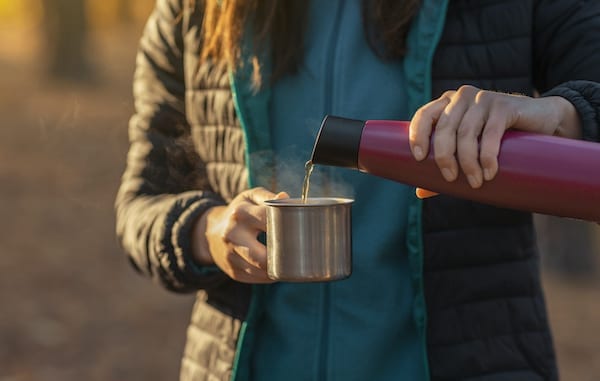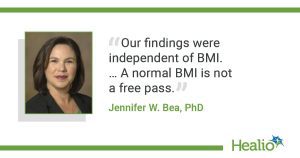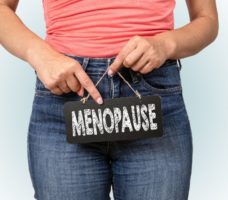While we’ve been studying the links between depression and fertility in women and depression throughout men’s lives, we haven’t gathered nearly as much information on how or why perimenopause and menopausal change trigger depression in a larger proportion of women or who might be more vulnerable to the bigger forms of depression, like Clinical Depression and a variety of mood disorders. New studies are finally being published, like the ones discussed in World of Psychology clearly showing women of a certain age are more likely to experience bouts of depression of varying severity. Depression studies and treatments are a multibillion dollar industry in America, so why haven’t we done loads of studies on the link between perimenopause and depression already?
Depression is a part of perimenopause in some way for a whole lot of us, and it creeps up. For me, bouts of depression started before the hot flashes and other classic perimenopause symptoms. Were those weeks when even moving was tough just PMS, like the doctors said, or where they the earliest signs of The Change? I think the biggest reason we don’t have a lot of statistics and data explaining the link between perimenopause and depression is that it’s tough to tell when exactly perimenopause starts.
For me, depression was something I grew up with. I didn’t have it, but I was surrounded by people who struggled with a range from the blues right up into Clinical Depression. I was a highly empathic child, so I had the opportunity to drink from Depression’s cup often. When The Blues and her darker cousins arrived on my doorstep in my late thirties, I saw them as a natural part of life and sought natural remedies first.
If natural or holistic medicine is where you’re at right now, you might want to try some of the remedies that have worked for me.
First Order of Business: Assemble Your Team!
I’ve been lucky. Natural remedies and Holistic medicines have helped me weather the stormy waters of depression through perimenopause. If you’re facing depression, I strongly recommend you seek help through not only holistic medicine and alternative practitioners, including but not limited to acupuncture, massage therapy, energy medicine, Reiki, and others, but that you also find a good doctor, nurse practitioner, and or therapist. Sometimes, recognizing when you need help from the pros is a challenge through the lens of depression and the blues, so it’s wise to assemble your team straight away at the first onset of depression.
Laugh, Really! It Eases The Blues.
Finding a sense of humor about the whole situation has been crucial to dealing with the darker days for me. Sometimes, I stand with my dog, my bird, and, if I’m lucky, my boy, and we laugh. Not just a polite chuckle, and definitely not because something made us laugh. We reach deep down into our bellies and make the sounds of laughter. It helps to tilt your head back while you do it, as if you’ve just heard the absolute funniest joke ever told in all of creation. Sure enough, within one or two peals of fake laughter the staged laughing becomes real. I’m always amazing by how much a good bout of laughter can lift the pallor from my mood.
For those moments when I need to laugh, but the drama of fake belly laughing with the menagerie isn’t quite right, I pick up a good book on The Change. Personally, I like Ripe: The Truth About Growing Older and the Beauty of Getting on with Your Life by Janet Champ and Charlotte Moore. It’s short enough that I can read it cover to cover inside of two hours. The ride through it is filled with smiles, laughter, tears, and that comforting shared indignation that makes me fell a lot less lonely. When you’re not quite so blue, search the shelves of your online or local book shop’s humor or women’s sections for a title on menopause and perimenopause or aging that makes you smile. That’s the one you want to have at the ready for those days when The Blues sisters have got you down.
Make Tea for Comfort and Nourishment
Another comfort to have at the ready is a good tea or tea blend. Even if you’re not into herbal teas, a good cup of English Breakfast or maybe a nice mellow Genmaicha or brown rice tea from Japan can feel like a wonderful, warm hug. There’s a reason the English make tea at the first sign of trouble, after all. I keep a drawer full of teas of the Camellia sinensis varieties, black, green, oolong, white, yellow, and pu’erh. When I’m feeling down, a cup of tea does me soul good.
I also have a selection of herbal teas at the ready. If anxiety or insomnia helped me arrive in the hole I’m digging myself out of, the stimulating properties of Camellia sinensis may or may not contribute to the problem more than they solve it. Anxiety and insomnia can both be aggravated by stimulants of any kind, including coffee, sugars and sweeteners, and, alas, tea.
Other Herbs that Ease Depression can Help, too.
Herbs I’ve liked best when I’m down include Rooibos, also known as Honeybush or Red Tea. It’s been used in South Africa as a folk remedy for a variety of complaints, including PMS, perimenopausal, and menopausal symptoms. According to the scientists, Rooibos contains physoestrogens, which help our bodies produce the estrogens we’re lacking during hormonal fluctuations. It also contains a wealth of minerals, antioxidants, and calming properties. What I’ve noticed is that a cup or two a day of Rooibos tea lifts my spirits and makes me feel loved just as I am, which are precisely the effects I want when I’m down.
Lemon Balm is another go-to for me. I keep it in tincture or infused-honey form. Lemon Balm, also known as Melissa Officinalis, was called the Herbe of Good Cheere by our middle age ancestors. It’s ability to bring a smile to your face, particularly if the depression you’re suffering is akin to SADs or environmentally induced, is well-documented. For me, the perimenopausal depression I’ve had has ranged from a light case of the blues to deep, dark, soul-sucking sorrow. Lemon Balm helps with the lighter stuff, and I reckon it doesn’t harm me when I’m in darker territory.
Cocoa is another favorite mood-lifter of mine. I use soy milk, which may or may not improve estrogens for women of my age. It depends on which study or source you read, but in my experience a cup of soy milk a day seems to do no harm. The cocoa I put in it does a lot of good, too. Cocoa is a mild stimulant, but it’s stimulation is mainly in the feel good centers of the brain. Cocoa helps to lift one’s mood without aggravating your nervous system. When I’m dealing with bouts of anxiety and insomnia along with depression, I usually skip cocoa…or at least the sugar or sweeteners. Chocolate works just as well as cocoa, assuming you’re taking chocolate with a high cacao content. Hershey’s won’t cut it. I go for the cocoa because I can adjust the amount of sweetener in my cup. Truly, a daily does of chocolate or cocoa is a common sense approach to depression when perimenopause (or life or the world) gets me down.
Saint John’s Wort is an herb that’s been well-studied for depression as well. Tincture is the best way to get it. The hypericin is what you’re after, if you’re using it as the studies say you ought. Flower essence of Saint John’s Wort has also been used for depression effectively. If you choose the tincture, plan to take it three times a day every day for a longer time. Saint John’s wort needs time to work its magic on your brain chemistry to be truly effective. In flower essence form, you should notice some change quickly with greater improvement over the long haul just like with other flower essence therapies.
Make time to Ride the Tears.
Making time to weep has helped me, too. When I notice my mood is slipping into a down cycle, I give myself a day or two to experience it, including as much alone time as I can or feel I need to really weep. Weeping can ease sorrows you didn’t know mattered. It can shift your body’s chemistry and allow you to release toxins. Have you ever noticed how when you weep really deeply, your breath comes in huge gulps, your chest contracts as if to push every last molecule of breath out again? The lungs are our primary means of detoxification. When we weep, we’re not only easing sorrows and releasing pent up pain, we’re setting the physical elements, the chemicals and toxins associated with that pain, free forcefully. A good cry can be exactly what your body needs to release the remnants of long resolved sorrows, like a good housecleaning.
Sometimes, just giving myself the space to be sad is enough and the depression lifts of its own accord. Sometimes, I can feel myself wallowing, like a stuck pig, in the muddy waters of sorrow. That’s when I push myself to get moving and shift my focus. Exercise, a steady diet, plenty of time for sleep, and a request to my family for a few days of relative quiet and harmony usually helps me to climb back out of the hole when I get stuck.
Do the Deeper Work by The Rules, the Get on with Life
Sometimes The Blues and Depression are signs I need to do some personal healing and soul work. I set the rules and time frame for the work and stick to them strictly. During the time I’ve set, I’m willing to examine the deeper, more painful stuff my psyche wants to raise. I’m willing to weep, mope, rage, cry, grieve, and do whatever else I need to for the healing to happen. At the end of the time frame, it’s time to get back to regular life.
Sure, the down mood may not turn off like a clock, but I act as if I expect my mind, body, and soul to get back to equilibrium. They usually do. When they don’t, I have a team of pros to help me out…which is why I urge women who are heading into the perimenopausal years to assemble that team before depression arrives. It’s a whole lot easier to ask for help when you already know who to call.
Most importantly, know that you’re not alone, and that perimenopausal blues and depression will pass. For most of us, menopause will bring more emotionally stable times, at least so far as our personal chemistry is concerned. While we’re making the transition, it can seem like it’ll last forever. It can seem at times unbearable and bleak. It can seem like all your energy has up and left. We’re lucky to have the many holistic and natural remedies our ancestors had alongside the newer tools modern medicine and therapy offer to help us through it. I expect years from now I’ll look back on this time in my life and remember it almost fondly, the way I remember the pains of childbirth now. I hope you will, too.
This content was originally published here.









